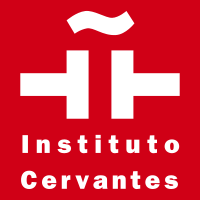 | |
| Founded | 11 May 1991 |
|---|---|
| Founder | Government of Spain |
| Type | Cultural institution |
| Location | |
Area served | Worldwide (45 countries) |
| Product | Spanish cultural and language education |
Members | 148,670 students (2019)[1] |
| Owner | Government of Spain |
Key people | Felipe VI (Honorary President) Ángeles Moreno Bau (Chairwoman) Luis García Montero (Director) |
| Employees | 951 (2019)[1] |
Volunteers | 1,240 (2019)[1] |
| Website | www.Cervantes.es |
Instituto Cervantes (Spanish: [instiˈtuto θerˈβantes], the Cervantes Institute) is a worldwide nonprofit organization created by the Spanish government in 1991.[2] It is named after Miguel de Cervantes (1547–1616), the author of Don Quixote and perhaps the most important figure in the history of Spanish literature. The Cervantes Institute is the largest organization in the world responsible for promoting the study and the teaching of Spanish language and culture.
This organization has branched out to 45 countries with 88 centres devoted to the Spanish and Hispanic American culture and Spanish language.[3] Article 3 of Law 7/1991, of March 21, created the Instituto Cervantes as a government agency. The law explains that the ultimate goals of the Institute are to promote the education, the study and the use of Spanish universally as a second language; to support the methods and activities that would help the process of Spanish language education, and to contribute to the advancement of the Spanish and Hispanic American cultures throughout non-Spanish-speaking countries.[4][5]
- ^ a b c "Cervantes Institute in numbers" (PDF). www.cervantes.es. 2019. Retrieved 13 November 2020.
- ^ [1] Archived December 14, 2007, at the Wayback Machine
- ^ "Cervantes homepage". Cervantes.es. Retrieved 2015-08-01.
- ^ "Instituto Cervantes: Spain's Language and Cultural Center | Manila Bulletin". Mb.com.ph. 2005-08-25. Archived from the original on 2012-09-08. Retrieved 2012-06-10.
- ^ "Instituto Cervantes celebrates its 15th year | Manila Bulletin". Mb.com.ph. 2007-11-06. Archived from the original on 2012-09-04. Retrieved 2012-06-10.